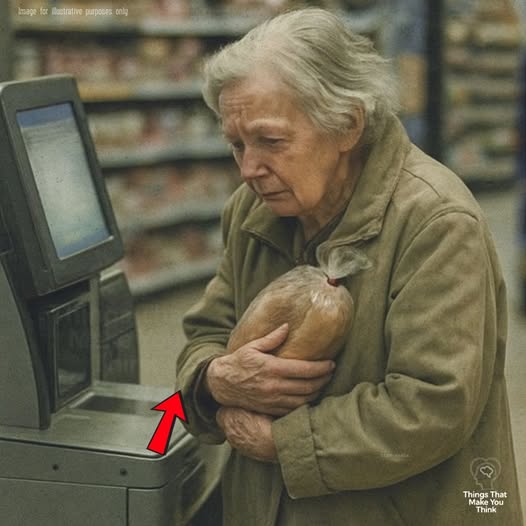
I watched an old woman stand at the self-checkout for fifteen minutes, clutching a loaf of bread, too ashamed to ask for help.
My name’s Mark. I’m 45. I work the late shift at a Walmart in Ohio. People think it’s boring—scanning bar codes, bagging groceries, cleaning up spills in aisle seven. But boredom has a way of hiding things, if you’re not paying attention.
Her name was Ruth. Seventy-nine. Hair the color of fresh snow, shoulders caved in like the weight of the world sat on her back. She came every Tuesday, always around 5 PM, always carrying the same two things: a loaf of bread and a carton of milk.
And every Tuesday, I watched her walk up to the self-checkout, stand there frozen, and then leave. No bread. No milk. Just empty hands pressed into the pockets of her old coat.
At first, I thought maybe her card didn’t work. Maybe she just forgot her PIN. But the third time, I followed her outside.
“Ma’am,” I said, trying not to startle her, “did you want me to help you check out?”
She blinked, lips trembling. Then she lifted a hand to her ear, shook her head, and whispered something I could barely hear. “I can’t… I can’t hear… these machines… I don’t know what to do.”
Her eyes filled with tears. She wasn’t just confused. She was ashamed.
That night, sitting in my empty apartment, I couldn’t stop seeing her face. I’d been divorced two years, living in silence of my own kind. But hers? Hers was heavier. A silence made of isolation, not choice.
So I pulled up YouTube. “Basic American Sign Language.” For hours, I sat in front of my laptop mouthing words, shaping my hands. “Hello.” “Help.” “Milk.” My fingers felt stiff, my brain clumsy. But I kept going.
The next Tuesday, Ruth came again. This time, I was waiting near the self-checkout. I caught her eye, lifted my hand, and signed the word “help.”
She froze. Then, slowly, her face broke into the kind of smile that makes you feel both proud and ashamed at the same time. Proud that you tried. Ashamed that it took you so long.
Together, we scanned her bread and milk. I mouthed “okay?” She nodded, clutching the bag like it was treasure. Before she left, she raised her hands, fingers shaky, and signed back: “Thank you.”
I nearly cried right there next to the Mountain Dew display.
It didn’t stop with her.
The college kids working part-time at the store noticed. One night, Sarah, nineteen, tapped my arm. “Hey, what were you doing with that lady? Was that, like… sign language?”
“Yeah,” I said. “Just the basics.”
She grinned. “Teach me.”
So I did. Then Carlos from produce joined. Then Jenny from the pharmacy. Now, on Tuesdays, you’ll see three of us scattered near the self-checkouts, ready to quietly sign “help” to anyone who looks lost.
Two months ago, Ruth didn’t show. I worried. The next week, her grandson came instead. He handed me a folded note in her handwriting. Shaky, but strong: “Thank you for seeing me.”
I kept that note in my locker. It reminds me that not everyone who’s silent is choosing to be.
Last week, a man in a worn suit stopped at the self-checkout. He struggled with the scanner, hands trembling. Then he touched his chest, pointed to his ear. I signed “help.” He exhaled like he’d been holding his breath for years.When we finished, he signed back, slow and careful: “Thank you.”
I don’t think anyone else noticed. But I did.
We live in a country that moves too fast, where everything’s automated, where “self-service” often means leaving the most vulnerable behind. We measure efficiency in seconds, but forget the cost in dignity.
I learned something standing by those machines.
You don’t have to be fluent in ASL. You don’t need a fancy program or a big plan. Sometimes, all you have to do is see the quiet ones—and answer in their language, even if it’s clumsy.
Because in the end, it’s not about bread or milk. It’s about reminding someone that they matter.
And sometimes… that’s enough to feed a soul.
